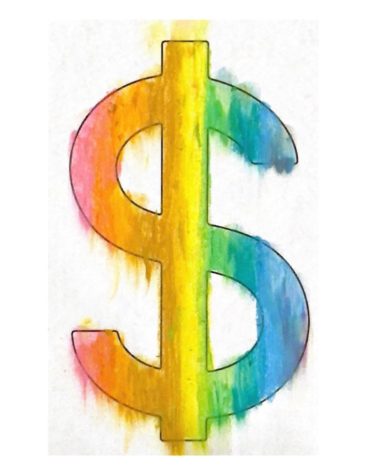Rainbow capitalism commodifies pride
October 13, 2021

(Cecilia Hammond)
Every year, Pride Month, which is celebrated in June, rolls by drenched in rainbow themed products and services disguised as LGBTQ+ allyship and support. Corporations use the month of June as a business opportunity to sell LGBTQ+ products and make a profit off of the celebration of gender and sexual diversity.
It is important to recognize that LGBT History Month in essence may appear the same, but it is not. LGBT History month is not only quieter and less commodified but celebrates what came before, while Pride celebrates what happens next.
When Pride is approaching, I feel a mix of excitement and dread. Excitement for having a month to celebrate LGBTQ+ pride around the country, and dread for seeing all of the business advertisements for pride products that are profit-driven and ingenuity. Pride month was not intended to be a capitalism-fueled, economically oriented celebration. So, what was it intended to be?
Pride month started in an effort to commemorate the Stonewall riots, which occurred at the end of June in 1969. During these riots, people at a gay bar in New York resisted arrest and fought against the police who were raiding the bar. Martha Johnson and Sylvia Rivera, two transgender women of color, were the first to resist arrest, and soon, this riot amassed a large group of LGBTQ+ activists resisting the police. The next year, the first Pride parades began to celebrate the brave, queer people at the Stonewall Inn that day. Unfortunately, Pride Month has lost some of its political emphasis.
Nowadays, Pride Month is celebrated through Target LGBTQ+ merchandise and rainbow french fry containers at McDonalds. But, does brand support for the LGBTQ+ community mean genuine support? The short answer is no.
Take, for example, Amazon, McDonalds and Walmart. Collectively, these companies donated over $1 million to politicians who voted against The Equality Act, which sought to ban discrimination on the basis of gender identity, sexuality and sex.
Studies found that 25 corporations, which included CVS, AT&T, Walmart and Comcast, donated $10 million in the past two years to anti- LGBTQ+ politicians. These same companies advertised rainbow merchandise and slogans throughout the month of June and capitalized on the profits made from said merchandise.
If big-name companies that refuse to support actual legislative change benefiting LGBTQ+ people in the United States are the main benefactors of Pride Month, was pride meant to be part of a capitalist society to begin with?
Pride was intended to be a part of every society and to be celebrated by every LGBTQ+ person, but capitalism and commodification have taken advantage of celebrating pride to no end. The impact that commodification has on pride has negative effects on LGBTQ+ people across the nation because many companies take advantage of pride and donate to politicians and organizations that are not in complete support for LGBTQ+ legislation.
Some companies do use the profits they make off of LGBTQ+ merchandise to pro- LGBTQ+ organizations. Skittles donated $1 to The Gay and Lesbian Alliance Against Defamation per pack of pride skittles they sold, which totalled to up to $100,000. Additionally, DocMartens donated $100,000 to The Trevor Project, which aims to end suicide among LGBTQ+ youth.
It is also important to recognize the smaller organizations that are owned by LGBTQ+ people and seek to benefit the queer community. Loyalty Bookstore, located in Washington D.C., is owned by a Black, queer woman named Hannah Oliver. The store works to diversify literature to benefit queer communities of color. Gc2b, is a transgender and Black owned business that sells clothing specifically designed for transgender people. Finally, Black Queer Magic is a store that creates crystals, jewelry stamps and more that emphasize BIPOC and queer liberation.
These organizations all sell LGBTQ+ related products, benefit queer owners and benefit the queer community as a whole, demonstrating that, despite the capitalist reinvention of Pride, it is still meant to be a part of every society.
Although Pride month has lost some of its political roots and has been commodified, queerness of every kind is deserving of celebration and advocacy. To do so, one of the best things a person can do during this LGBT History Month is educate themselves on what companies support LGBTQ+ organizations and politicians and be aware of which companies only produce pride merchandise to make a profit.
LGBTQ+ pride as a whole should be rooted in celebration and activism directed toward the queer community, and through education, support and involvement, LGBTQ+ Pride can be exactly that.






















Leave a Comment